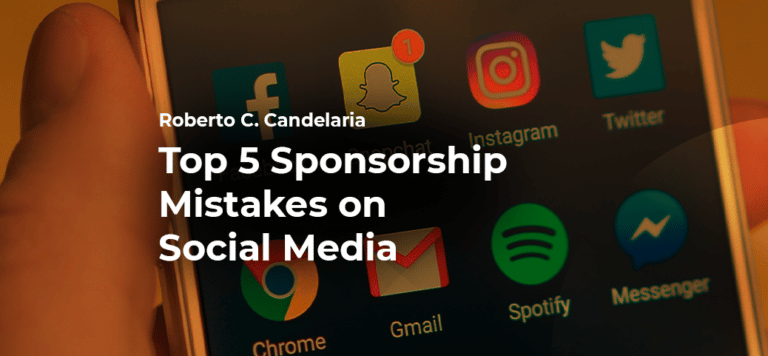How to Get Sponsored — Where Do I Begin?
A common question I get by those learning how to get sponsored or just want to know how to get sponsored is “Where do I begin?”
In fact, I asked the same question many years ago when getting sponsored for the first time.
When I first started securing sponsorship for organizations I was volunteering with, I was scared of not getting sponsored. Not only was I unsure of where to start, I couldn’t find the resources I desperately needed to become successful.
This isn’t unusual, as only an estimated 18% of non-profits have a department or staff dedicated to handling sponsorships for the organization and that percentage is even less in for-profit companies.
Over the past 15+ years I’ve had the honor of working with several organizations, for-profit and non-profit, and learned the sponsorship world from the ground up. It hasn’t always been easy, and for the first few years, my proposals were rejected more often than they were accepted. Thankfully, one of the many things that my parents taught me was to never give up. My dad, who has had great success in sales, once told me that the only difference between us was that he had heard a lot more “no’s” than I had.
I thought about that comment as I continued my journey in the sponsorship world, and one day an idea came to my mind. What if I could engage the sponsorship department that had just rejected my proposal in a conversation, instead of merely hearing “No” and walking away?
It was a long-shot idea, but a tried it. Much to my surprise, the young lady I was working with gave me the top 3 reasons my proposal wasn’t approved and she told me how to increase my opportunity for approval the next time. I was blown away! I really didn’t think they’d lay out the road map to being successfully funded by their company.
Just to make sure this wasn’t an isolated incident, I had the same conversation with a different company that had not funded another proposal, and received a similar response. I realized I was onto something and started calling just about every company that hadn’t funded one of our proposals. I spoke with administrative assistants, sponsorship coordinators, and even a few VPs of Marketing throughout the US. Through these conversations I developed a road map that resulted in the approval of a greater percentage of my proposals.
These experiences reminded me of one of the most important lessons my parents taught me, the importance of relationships. When it came to securing sponsors for one-time, annual, or virtual events, it came down to the quality of my relationship with the sponsor, every time.
Over time, I learned five keys to improve the quality of my sponsorship relationships and I’d like to share them with you.
1. Relationships take time.

Think of the people and businesses with which you have a relationship. Did you start out as instant friends? Of course not, it takes time to get to know people and to build their trust. Developing sponsors to support your organization is not like selling encyclopedias door-to-door. Your business is going to be around for a long time, so be patient and invest time in building a good relationship with the people and organizations that will help fund your business through sponsorship.
2. Be supportive of your potential sponsors.

This should be common sense, but I’ve seen too many people not provide potential sponsors with the information they need to approve your funding. Be willing to meet for coffee to discuss your project and to provide any information and backup data the prospect may request. If he asks for time to consider your project, don’t push for the close. You are not selling an appliance or a used car. It is very common for more than one party, or even a board, to be part of the decision making process. Be willing to make more than one visit and to be asked to speak to more than one party. You are the matchmaker, looking for those great connections, and that doesn’t happen instantaneously.
3. Be respectful of your sponsor’s time.

He may not have a lot of time for coffee meetings, phone calls or SKYPE. If he tells you he has 15 minutes, prepare a 10-minute presentation. This way at the end of your presentation, he has time to ask questions. Don’t assume that once he hears about your sponsorship opportunity that he will be more than happy to cancel all meetings and spend the afternoon with you. If you are calling a business, the person you are talking to is on the time clock and has other commitments. Present your case well, meaning concisely, and be ready to leave.
4. Plan ahead and be ask for timelines.

If you are a procrastinator, then it is definitely time to change. It never works to rush a sponsor. If you are working on a large event, like a golf tournament or musical festival, the effort should begin several months to a year in advance. Even smaller events require a great deal of planning. There is an old saying in business, “A lack of planning on your end does not constitute an emergency on mine.” This is very true in the sponsorship world.
5. Conduct your affairs in a professional, business-like manner.

This demonstrates both organizational stability and your consideration for the prospective sponsor. You might be smaller, but your conduct can sway their opinion in your favor.
If you’ve been thinking about getting sponsored or learning how to get sponsored, these steps will get you moving in the right direction. You don’t need to get it perfect before you get started. In fact, that’s pretty impossible! Start taking steps towards getting sponsors, and you can fine-tune your process once you’re in motion.




13 Comments
Comments are closed.